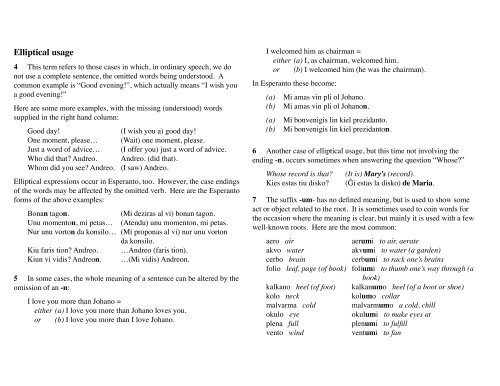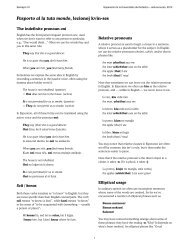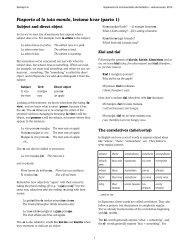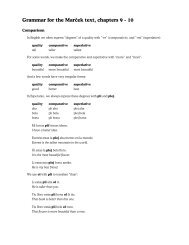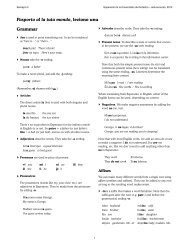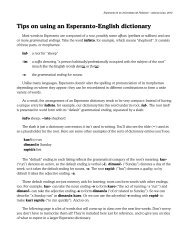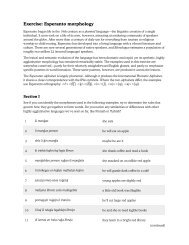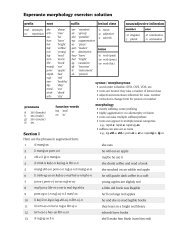The alphabet and pronunciation - Lodestone
The alphabet and pronunciation - Lodestone
The alphabet and pronunciation - Lodestone
- No tags were found...
Create successful ePaper yourself
Turn your PDF publications into a flip-book with our unique Google optimized e-Paper software.
Elliptical usage4! This term refers to those cases in which, in ordinary speech, we donot use a complete sentence, the omitted words being understood. Acommon example is “Good evening!”, which actually means “I wish youa good evening!”Here are some more examples, with the missing (understood) wordssupplied in the right h<strong>and</strong> column:! Good day!! (I wish you a) good day!! One moment, please…! (Wait) one moment, please.! Just a word of advice…! (I offer you) just a word of advice.! Who did that? Andreo.! Andreo. (did that).! Whom did you see? Andreo.! (I saw) Andreo.Elliptical expressions occur in Esperanto, too. However, the case endingsof the words may be affected by the omitted verb. Here are the Esperantoforms of the above examples:! Bonan tagon.! (Mi deziras al vi) bonan tagon.! Unu momenton, mi petas…! (Atendu) unu momenton, mi petas.! Nur unu vorton da konsilo…! (Mi proponas al vi) nur unu vorton! ! ! da konsilo.! Kiu faris tion? Andreo.! …Andreo (faris tion).! Kiun vi vidis? Andreon.! …(Mi vidis) Andreon.5! In some cases, the whole meaning of a sentence can be altered by theomission of an -n:! I love you more than Johano =! ! either!(a) I love you more than Johano loves you.! ! or! (b) I love you more than I love Johano.! I welcomed him as chairman =! ! either!(a) I, as chairman, welcomed him.! ! or! (b) I welcomed him (he was the chairman).In Esperanto these become:! (a)! Mi amas vin pli ol Johano.! (b)! Mi amas vin pli ol Johanon.! (a)! Mi bonvenigis lin kiel prezidanto.! (b)! Mi bonvenigis lin kiel prezidanton.6! Another case of elliptical usage, but this time not involving theending -n, occurs sometimes when answering the question “Whose?”! Whose record is that?! (It is) Mary’s (record).! Kies estas tiu disko?! ("i estas la disko) de Maria.7! <strong>The</strong> suffix -um- has no defined meaning, but is used to show someact or object related to the root. It is sometimes used to coin words forthe occasion where the meaning is clear, but mainly it is used with a fewwell-known roots. Here are the most common:! aero air! aerumi to air, aerate! akvo water! akvumi to water (a garden)! cerbo brain! cerbumi to rack one’s brains! folio leaf, page (of book)! foliumi to thumb one’s way through (a! ! ! ! ! book)! kalkano heel (of foot)! kalkanumo heel (of a boot or shoe)! kolo neck! kolumo collar! malvarma cold! malvarmumo a cold, chill! okulo eye! okulumi to make eyes at! plena full! plenumi to fulfill! vento wind! ventumi to fan


